Daily Vocabulary Words: List of Daily Used Words in Leading Indian Newspapers
Hi there. Welcome to this special section @ Wordpandit. Our endeavour here is straightforward: highlighting daily vocabulary words that you would come across in leading newspapers in the country. We have included the following newspapers in our selection:
• The Times of India
• The Economic Times
• Hindustan Times
• Mint
• Indian Express
We are putting in extensive work to develop your vocabulary. All you have to do is be regular with this section and check out this post daily. This is your repository of commonly used words; essentially, we are posting a list of daily used words. Hence, this has significant practical application as it teaches you words that are commonly used in leading publications mentioned above.
Visit the website daily to learn words from leading Indian newspapers.
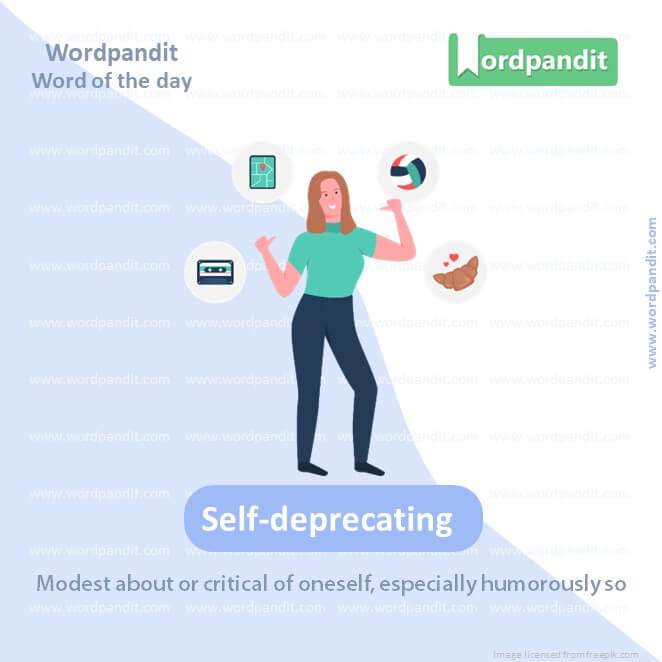
WORD-1: Self-deprecating
CONTEXT: The actor’s self-deprecating humor during the interview endeared him to his fans even more, proving that humility goes a long way in the industry.
SOURCE: The Times of India
EXPLANATORY PARAGRAPH: Imagine you made a funny drawing and showed it to your friend, saying, “It’s not the best, but I tried!” even if you think it’s good. That’s being self-deprecating, when you make a little joke about yourself or don’t boast about how good you are.
MEANING: Modest about or critical of oneself, especially humorously so (adjective).
PRONUNCIATION: self-deh-PREY-kay-ting
SYNONYMS: modest, humble, self-mocking, self-effacing, self-deriding, self-disparaging, down-to-earth.
USAGE EXAMPLE:
1. She made a self-deprecating joke about her cooking skills.
2. Even though he was talented, he always had a self-deprecating attitude.
3. Her self-deprecating humor always made the audience laugh.
4. He used self-deprecating comments to make others feel comfortable.
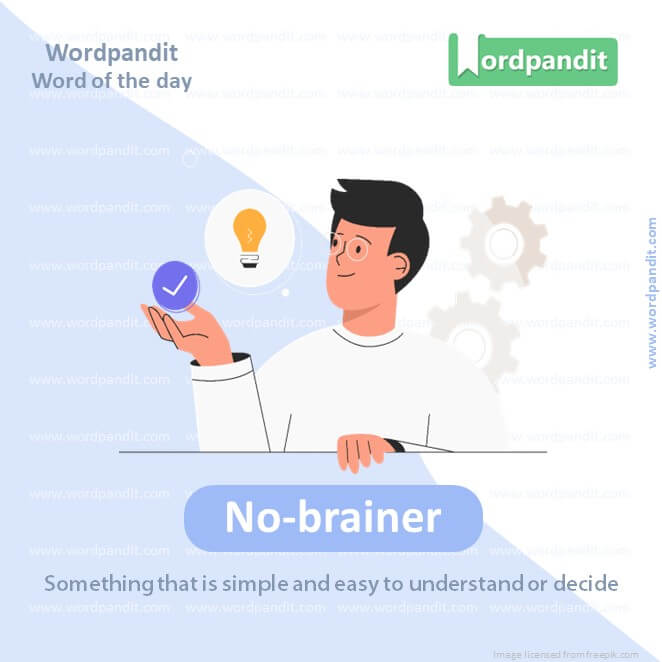
WORD-2: No-brainer
CONTEXT: Investing in sustainable technologies is a no-brainer for corporations looking to remain relevant in the future market.
SOURCE: The Economic Times
EXPLANATORY PARAGRAPH: Think about choosing between eating broccoli or a big scoop of ice-cream. For most of you, picking ice-cream is super easy, right? That’s what we call a “no-brainer.” It means the choice or answer is very clear and simple.
MEANING: Something that is simple and easy to understand or decide (noun).
PRONUNCIATION: noh-BRAY-ner
SYNONYMS: cinch, breeze, walkover, piece of cake, snap, duck soup, child’s play.
USAGE EXAMPLE:
1. Choosing the chocolate cake over the salad was a no-brainer.
2. For him, joining the basketball team was a no-brainer.
3. This game is a no-brainer for kids.
4. It’s a no-brainer to wear a coat when it’s snowing.
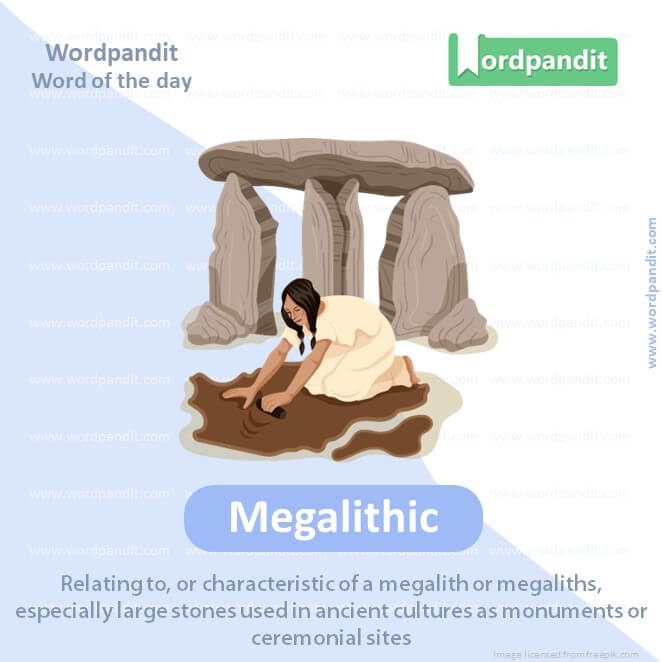
WORD-3: Megalithic
CONTEXT: The recent archaeological dig in the southern region uncovered megalithic structures that are believed to date back over 2,000 years.
SOURCE: Hindustan Times
EXPLANATORY PARAGRAPH: Imagine big, big stones, like the ones in a place called Stonehenge. These huge stones from a long time ago are called “megalithic.” It’s like mega (which means big) and lithic (which means stone).
MEANING: Relating to, or characteristic of a megalith or megaliths, especially large stones used in ancient cultures as monuments or ceremonial sites (adjective).
PRONUNCIATION: mega-LITH-ic
SYNONYMS: monumental, massive, colossal, gigantic, huge, towering, giant.
USAGE EXAMPLE:
1. The megalithic structures are popular tourist attractions.
2. Researchers are studying the purpose of these megalithic stones.
3. The ancient site contained several megalithic carvings.
4. Megalithic monuments are proof of the skills of ancient civilizations.
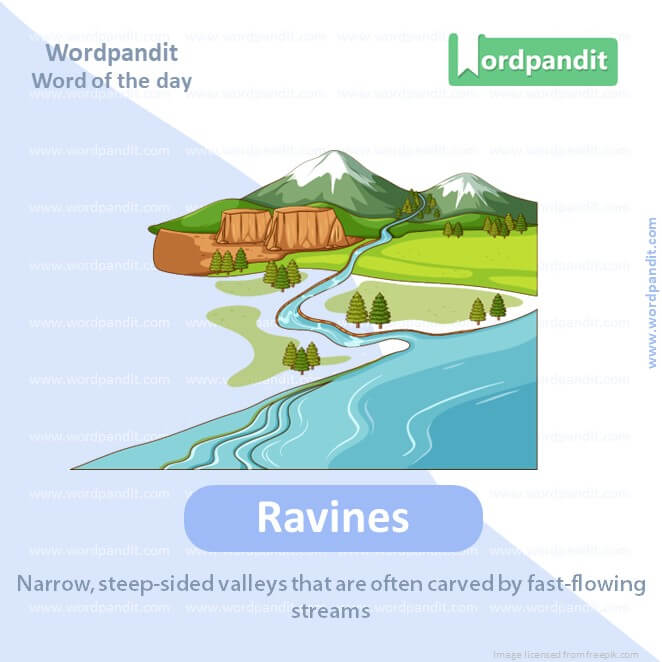
WORD-4: Ravines
CONTEXT: The new highway project has faced challenges due to the deep ravines that characterize the terrain of the northern region.
SOURCE: Mint
EXPLANATORY PARAGRAPH: A ravine is like a big ditch or a deep cut in the ground, often where water runs through. Think of it as a smaller cousin of a canyon.
MEANING: Narrow, steep-sided valleys that are often carved by fast-flowing streams (noun).
PRONUNCIATION: ruh-VEENS
SYNONYMS: gorge, canyon, chasm, gulch, gully, defile.
USAGE EXAMPLE:
1. We hiked through the forest and across several ravines.
2. The waterfall flowed into a deep ravine.
3. Be careful while trekking near the edges of ravines.
4. The ravines in the region have been formed over thousands of years.
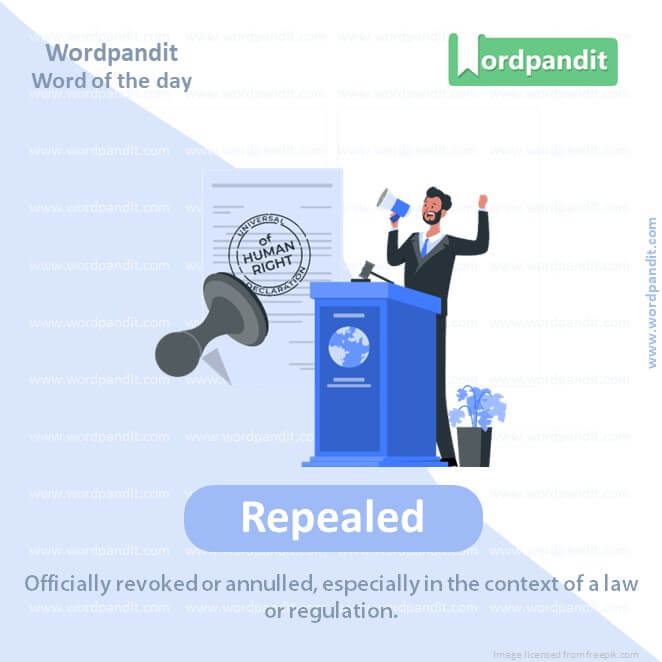
WORD-5: Repealed
CONTEXT: The controversial law that faced nationwide protests last year was finally repealed by the parliament after intense deliberation.
SOURCE: Indian Express
EXPLANATORY PARAGRAPH: Imagine there’s a rule at home that you can’t have candy. But then, one day, your parents decide that rule isn’t needed anymore and remove it. That’s like when a law is “repealed.” It means it’s taken back or canceled.
MEANING: Officially revoked or annulled, especially in the context of a law or regulation (verb).
PRONUNCIATION: ree-PEELED
SYNONYMS: revoke, rescind, overturn, annul, retract, void, abolish.
USAGE EXAMPLE:
1. The old law was repealed last year.
2. Citizens campaigned until the policy was repealed.
3. The mayor repealed the controversial decision after protests.
4. Many hoped that the decision would be repealed.
WORD-6: Trivial
CONTEXT: Critics argue that focusing on such trivial issues diverts attention from the larger, more pressing concerns of the nation.
SOURCE: The Times of India
EXPLANATORY PARAGRAPH: Imagine you drop a tiny crumb on the floor and your friend says, “Oh no! A huge mess!” They’re joking because a tiny crumb isn’t a big deal. When something is small or not very important, we say it’s “trivial.”
MEANING: Not important or of little value (adjective).
PRONUNCIATION: TRIH-vee-ul
SYNONYMS: insignificant, minor, petty, negligible, unimportant, slight, small.
USAGE EXAMPLE:
1. Don’t worry about such trivial matters.
2. The game was just for fun, so the mistakes were trivial.
3. They spent the afternoon discussing trivial topics.
4. The differences between the two designs are trivial.
WORD-7: Articulate
CONTEXT: The minister was articulate in laying out the government’s vision for the next decade during his speech at the annual conference.
SOURCE: The Economic Times
EXPLANATORY PARAGRAPH: When someone speaks really clearly, like every word they say is easy to understand, they’re being “articulate.” It’s like when you have building blocks, and you connect them perfectly to make a cool toy.
MEANING: Able to express thoughts and ideas clearly and effectively (adjective); to express something in words (verb).
PRONUNCIATION: ahr-TIK-yuh-layt
SYNONYMS: eloquent, fluent, clear, coherent, lucid, expressive, well-spoken.
USAGE EXAMPLE:
1. She’s very articulate, which makes her a great speaker.
2. It’s important to articulate your feelings.
3. He couldn’t articulate why he was upset.
4. The president gave an articulate speech about the economy.
WORD-8: Outrage
CONTEXT: The incident in the city’s central square sparked outrage among citizens, leading to widespread demands for justice.
SOURCE: Hindustan Times
EXPLANATORY PARAGRAPH: Imagine someone took your toy and broke it for no reason. You’d feel really, really upset, right? That very strong feeling of anger and shock is called “outrage.”
MEANING: A strong feeling of anger or shock because of something seen as wrong or unfair (noun).
PRONUNCIATION: OUT-rayj
SYNONYMS: fury, indignation, anger, ire, wrath, resentment, affront.
USAGE EXAMPLE:
1. The decision caused public outrage.
2. An act of cruelty will always spark outrage.
3. Her comments led to outrage from many fans.
4. The scandal was met with widespread outrage.
WORD-9: Non-partisan
CONTEXT: The new committee, formed to review the policies, boasts a non-partisan panel ensuring unbiased recommendations.
SOURCE: Mint
EXPLANATORY PARAGRAPH: Imagine two teams playing a game and there’s a referee. The referee doesn’t support any team; he just ensures the game is played fairly. “Non-partisan” is like that referee. It means not supporting one group over another.
MEANING: Not biased or favoring any political party or group (adjective).
PRONUNCIATION: non-PAHR-ti-zuhn
SYNONYMS: impartial, neutral, unbiased, unprejudiced, objective, fair, balanced.
USAGE EXAMPLE:
1. The committee aims to be non-partisan.
2. Her review was seen as non-partisan and honest.
3. Non-partisan groups are monitoring the elections.
4. It’s important to get non-partisan opinions on the issue.
WORD-10: Intrepid
CONTEXT: The intrepid journalist traveled to conflict zones to bring ground realities to the fore, earning respect from peers and readers alike.
SOURCE: Indian Express
EXPLANATORY PARAGRAPH: Imagine a superhero who is never afraid to go on big adventures or face dangerous things. That bravery and courage are what “intrepid” means. It’s like being super brave!
MEANING: Very brave and fearless (adjective).
PRONUNCIATION: in-TREH-pid
SYNONYMS: brave, courageous, fearless, dauntless, valiant, gallant, bold.
USAGE EXAMPLE:
1. The intrepid explorer ventured into the uncharted jungle.
2. Her intrepid spirit helped her overcome many obstacles.
3. They set out on an intrepid journey across the mountains.
4. The intrepid journalist reported from the war zone.
vocabulary cards
In the realm of language learning, an individual’s arsenal is incomplete without the essential tool of ‘vocabulary cards.’ Vocabulary cards, also known as flashcards, are a potent method to imprint new words, phrases and their meanings into our memory. They have been used for centuries for their effective learning approach and cognitive retention benefits.
Vocabulary cards are typically designed with a term on one side, and its meaning or translation on the other. This learning tool engages our brain’s active recall, a vital process in long-term memory imbibing. However, these vocabulary cards should not just be seen as standalone pieces of paper; they are keys to unlocking the treasuries of new languages.
To harness the best results from vocabulary cards, one must follow a planned method. Firstly, the words and phrases should be relevant to the learner’s requirement. Niche words about the user’s profession or daily life activities are particularly profitable choices. Secondly, incorporate these flashcards into regular study routine to ensure consistent revising. It is suggested to do short, multiple study sessions throughout the day, rather than one long session.
Another significant factor in learning vocabulary cards is the Leitner System, an age-old method of spacing the revision of cards based on the learner’s proficiency. The cards that are difficult to remember should be reviewed more frequently than the ones that are easier.
Utilizing vocabulary cards provides a hands-on approach, reinforcing knowledge with each use. It helps learners to interact with the language, promoting better understanding and long-term retention. As such, vocabulary cards are far more than simple learning aids; they provide a comprehensive system for enhancing vocabulary, setting learners on the fast track to language proficiency.
In conclusion, vocabulary cards’ value should not be underrated. Explore these smart flashcards and begin your journey towards linguistic mastery consistently and effectively.











